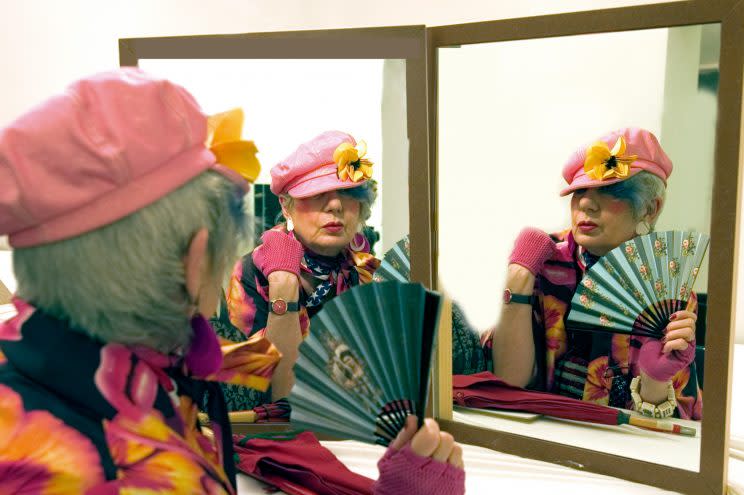Stop Dressing Your Age and Dress Your Life

Dress your age is advice we hear at almost every stage of life, particularly those of us entering the more mature stages of life — especially women over age 40. But what exactly does that mean?
A number of insights into this age-old saying have been making the rounds. The ensuing conversation makes it possible to envision a time — no better time like the present — when men and women alike will be encouraged to dress how they feel, rather than according to some socially constructed vision of how they’re supposed to present themselves.
Writer Julia Baird recently offered her thoughts in a New York Times op-ed titled, “Don’t Dress Your Age.”
“So what does it actually mean to dress like an ‘old lady’? Or even just ‘dress your age’?” Baird writes. “Women are more often criticized for dressing like younger, not older, versions of themselves. When you reach 40, you’re suddenly inundated with advice about ‘age-appropriate’ wear.”
This advice usually entails wrapping yourself in an increasing number of layers, to hide your wrinkles and changing shape within more and more dreary shades, as if the further we go along in life, the less we’re supposed to celebrate it with color, fabric, proper tailoring, bold statements, or whatever the hell we want.
“All this nonsense is why I adore the funky grandmothers you can find on Instagram who dance about in baubles and proudly sport turbans,” writes Baird. “They refuse to fade, hide or match their attire to the wallpaper.”
Think of the children
It’s not only women who feel the subtle social pressure to fade into the background as they move forward in life. Men too are expected to dress themselves in the comfortable, the unfashionable. Jokes about dad jeans and dressing like a grandpa tell a story of increasingly lower expectations for how men should look as they age, culminating as a punch line. But thankfully, there are shining examples of put-together men of older generations who refuse to give up their smart looks and continue to teach younger generations how to age with grace and refinement.
GQ recently spent some time with noted elder statesman of dapper Gay Talese. The celebrated journalist reveals in full-color how smart tailoring and attention to detail never go out of style, even when — especially when — you’re over 80 years old.
For Talese, that sense of style began with his father, who was a tailor. See, there’s that generational exchange again. “He had an enormous influence over me,” Talese explains. “He had a commanding presence, a sense of preciseness in tailoring. Very much stressed appearances. I had the same sense of wanting to be precise, a sense of exactitude, pride in prose.” Talese draws a parallel, appropriately, between the lessons he learned from his elder and the lessons he’s learned as a successful writer. “The idea was to create something that would last.”
We should be inspired by people like Talese and the many “funky grandmothers” of Instagram. Perhaps one of the more redeeming qualities of social media — once you get past the accessible narcissism of it all — is the way people of often disengaged or disenchanted fringes can gather together and encourage each other to be uniquely themselves. Just because you may be retired doesn’t mean you need to be resigned. Peruse the website and Instagram account of Advanced Style, if you’re curious about the state of stylishness in your senior years.
Lunch at Cowgirl in the west village.
A photo posted by Ari Seth Cohen (@advancedstyle) on Oct 3, 2016 at 10:25am PDT
Seersucker on 67th on the blog today Advanced.Style #advancedstyle #menswear #nyfw #seersucker
A photo posted by Ari Seth Cohen (@advancedstyle) on Sep 15, 2016 at 1:19pm PDT
A photo posted by Ari Seth Cohen (@advancedstyle) on Oct 4, 2016 at 5:47am PDT
And if anything, be your most inspiring self inside and out so that younger generations can learn how to live to the fullest right alongside you.
The age to stop dressing your age
Back to Baird’s analysis: Dressing your age should be less about your years and more about your viewpoint. “Isn’t there a point when one can simply be a dowager, a grand old dame, or just a merry old boiler? When we can refuse to kowtow to prescriptions and permissions, but just march on in the shoes we fancy wearing?”
For Baird herself, that point in time may be a little ways off, somewhere in the distant future. Almost daydreaming, she writes: “I would saunter off, dangerously liberated, feeling envious eyes on my back — having reached, finally, the age when you can reject rejection.” But why wait? That age to stop dressing your age is now, before it’s too late.

